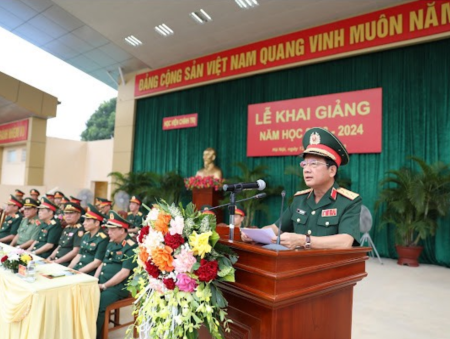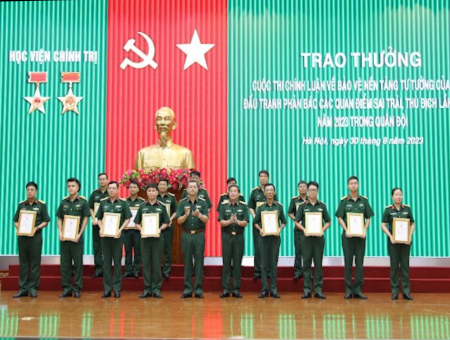Political Academy focuses on building a cadre of teachers and educational management officers on a par with the requirements and tasks of the new situation
In light of Decision No. 3525/QĐ-BQP dated August 3, 2023, by the Minister of National Defence approving the Project entitled “Building a cadre of teachers and educational management officers in the Military for the 2023 - 2030 period and beyond”, the Political Academy has focused on leading and directing the drastic and synchronised implementation of measures to effectively execute this pivotal Project.
As the leading centre of the Military for training and fostering political officers and conducting research in social sciences and humanities, in recent years, the Party Committee and Board of Directors of the Political Academy have thoroughly grasped the viewpoints of the Party, the Central Military Commission, and the Ministry of National Defence regarding the building of the cadres of officers. Therefore, the Party Committee and Board of Directors of the Academy have put forth numerous leadership directions and measures to build a cadre of officers at all levels, especially a standardised and well-structured cadre of teachers and educational management officers with increasingly high quality, thus ensuring a smooth transition between different generations. The cadre of teachers and educational management officers of the Academy consistently demonstrates strong political steadfastness, good moral qualities, broad knowledge, leadership and command capabilities, advisory skills, pedagogical competencies, and research abilities. These competencies are progressively elevated to meet the Academy’s increasingly demanding requirements and tasks of education and training, scientific research, and the struggle on the ideological and theoretical front. However, compared to the set requirements, the percentage of teachers and educational management officers holding scientific titles, especially the titles of Professor, People’s Teacher, and Outstanding Teacher, remains low and is not on par with their potential. Indeed, their proficiency in foreign languages and computer skills are still lagging behind the developmental trends of society.
 |
| Sr. Lt. Gen Trinh Van Quyet delivers a speech at the launch of new school year of the academy |
Currently, the cadre of officers, instructors, and researchers at the Academy with scientific titles, high academic degrees, and extensive experience is on a decreasing trend due to the retirement age. Young officers and instructors, although fundamentally trained, have limited experience while educational and training requirements and tasks require increasingly higher standards. To build a cadre of teachers and educational management officers who are devoted and capable of meeting the requirements and tasks in the new situation, contributing to building an “elite, compact, and strong” Military that advances straight to modernity, the Party Committee and Board of Directors of the Political Academy attach importance to the synchronised implementation of the measures as follows:
Firstly, strengthening the leadership and direction of party committees and organisations in building the cadre of teachers and educational management officers. This is a decisive measure for building a qualified cadre of teachers and educational management officers as higher echelons’ leadership and direction provide the basis, foundation, orientation, and guidance for their awareness and actions, ensuring that they uphold and enhance a sense of responsibility, exert effort, take initiative, innovate, and overcome all the difficulties to successfully fulfil their assigned tasks. To achieve high effectiveness, the Academy’s Party Committee and Board of Directors emphasise that party committees and commanders of agencies, faculties, and units must deeply grasp President Ho Chi Minh’s thought that “The mission of education is of paramount importance and glorious as education is nothing without teachers” and that education is the task of the Party and the whole and is a top national policy. Therefore, it is necessary to enhance the awareness of the position and significance of the cadre of teachers and educational management officers for the development of the education and training sector. The Academy’s Party Committee and Board of Directors should focus on leading and directing the dissemination of the viewpoints and principles regarding the building of the cadres of teachers and educational management officers and the personnel work, especially the Project entitled “Building the cadres of teachers and educational management officers in the 2023 - 2030 period and beyond”, Resolution No. 35/ NQ-ĐU dated June 18, 2019 of the Political Academy’s Party Committee on building the cadre of officers in the 2019 - 2030 period with a view to building the cadre of teachers and educational management officers in the 2023 - 2030 period. During the implementation process, it is crucial to adhere to the higher echelons’ direction and close coordination with relevant agencies and units throughout the Military to supplement and provide a pool of officers and teachers for the Academy.
Secondly, actively innovating and improving the quality of planning, selecting, training, and fostering personnel; closely combining building a cadre of command and management officers with building a cadre of teachers and educational management officers. This measure plays a crucial role in concretising the leadership resolutions on building the cadre of officers and teachers suitable to the practical situation of each agency, faculty, and unit. Accordingly, the Party Committee and Board of Directors of the Academy have directed agencies, faculties, and units to grasp the motto of “Effectively carrying out the work of sourcing, planning, and utilising the cadre of teachers and educational management officers to meet the requirements and tasks of education and training and the development orientation of training units and institutions” as well as higher echelons’ resolutions to formulate plans and development strategies for the cadre of officers and teachers, ensuring appropriateness with the units’ tasks. The process of formulating the planning of command and management officers should be combined with the building of a “dynamic” and “open-minded” cadre of teachers and researchers, tailored to the training sector and related specialisations. The process should be transparent and democratic, linked to assessment, evaluation, training, fostering, rotation, appointment, and utilisation of personnel. Moreover, the primary focus should be given to the quality of the process to ensure the comprehensive development of the personnel, thus not only providing a pool of officers for command and management posts but also creating motivation for officers to strive for improvement.
Additionally, the work of training and fostering officers should be regularly and continuously implemented with specific plans by identifying annual targets and subjects of training in each agency and unit. Besides, training should be linked to the utilisation and diversification of training methods. Centralised formal training, short-term training, and in-service training should be combined while the self-study, self-improvement, and self-cultivation roles of personnel at all levels should be leveraged. The Academy gradually standardises its cadre of officers and teachers by focusing on training and enhancing educational qualifications, foreign language competencies, and computer skills for officers based on their respective positions.
 |
| Leader of the academy awards outstanding individuals in the Third writing contest about the Party's ideological ground |
Thirdly, effectively implementing the management, assessment, appointment, and rotation of the cadre of teachers and educational management officers. This measure aims at improving the quality of management, assessment, and utilisation of the cadre of teachers and educational management officers. It also serves as a means to concretise the motto: “Theory is linked to the practice and the school is linked to the unit”. To effectively implement this measure, party committees and commanders at all levels need to excel in political and ideological education, building a sense of responsibility, organisational discipline, professional ethics, and the “7 dares” spirit. The assessment of officers should be based on strict self-criticism and criticism, following the principles of collectiveness, democracy, openness, and majority conclusion. Assessment should be based on the practice, linking officer assessment with appointment, placement, planning, training, fostering, and other stages of personnel management. The Academy should review, formulate, supplement, and amend related regulations and provisions regarding the assessment of officers and party members to create consensus and unity. Closely combining the management of the cadre of teachers and educational management officers with the management of party members; the assessment and classification of officers with the assessment and classification of party organisations and party members. The personnel mobilisation, appointment, and rotation of teachers and educational management officers, especially those with high competencies and scientific titles, should be strictly executed according to the set procedures and the opinions of relevant organisations. The Academy strives that by 2030, there will be a minimum of 95% of teachers and educational management officers meeting the standards of the State and the Ministry of National Defence while over 80% of teachers should have experience as commanders at brigade and division levels, in which from 20% to 30% should be capable of working in international environments.
Fourthly, enhancing the effectiveness of collaboration in training and fostering officers and well implementing the policies for officers and their families. The Political Academy continues to be proactive in contacting and coordinating with training institutions inside and outside the Military as well as foreign institutions to train officers, especially in specialisations where the Military lacks expertise. Indeed, the foreign language proficiency of officers is actively enhanced. Furthermore, it proactively proposes to the Ministry of National Defence the strategies, plans, roadmaps, and cooperative agreements with foreign training institutions, which aimed at further improving military knowledge, professional competencies, scientific research capabilities, and the ability to work in international environments. Besides, the Academy attaches great importance on effectively implementing the policies to ensure the material and spiritual life of officers and their families, especially by ensuring a conducive working environment, healthcare provisions, and support for research activities. The teachers and educational management officers are also provided with favourable conditions to fulfil all the required criteria for attaining professional titles and improving their competencies. The Academy aspires that, by 2025, it can establish a team of leading experts in various fields of military social sciences and humanities.
Fifthly, harnessing the proactive and pivotal role of the cadre of teachers and educational management officers in self-study and self-improvement. This measure serves as a driving factor in enhancing the quality of the cadre of teachers and educational management officers to meet the increasingly high requirements of education and training in the new situation. Therefore, party committees and commanders at all levels should effectively oversee, manage, and conduct ideological work to encourage and motivate teachers and educational management officers to actively and voluntarily engage in self-study and self-improvement to enhance the quality of teaching and scientific research in each period. Besides, they should base their assigned tasks on the standards and regulations to set appropriate objectives and formulate self-improvement plans. Furthermore, they should attach importance to improving their foreign language proficiency and computer skills to meet the requirements of international integration.
The synchronised and effective implementation of the abovementioned measures would help build a cadre of teachers and educational management officers on a par with the requirements and tasks of education and training in the new situation. This will make a significant contribution to the development of the Political Academy as an institution that is both regular and advanced, serving as an exemplary and leading institution for educating political officers and conducting research in social sciences and humanities for the Military and the nation, thus gaining an exceptional global and international reputation.
Major General TRUONG THIEN TO, Political Commissar of the Political Academy